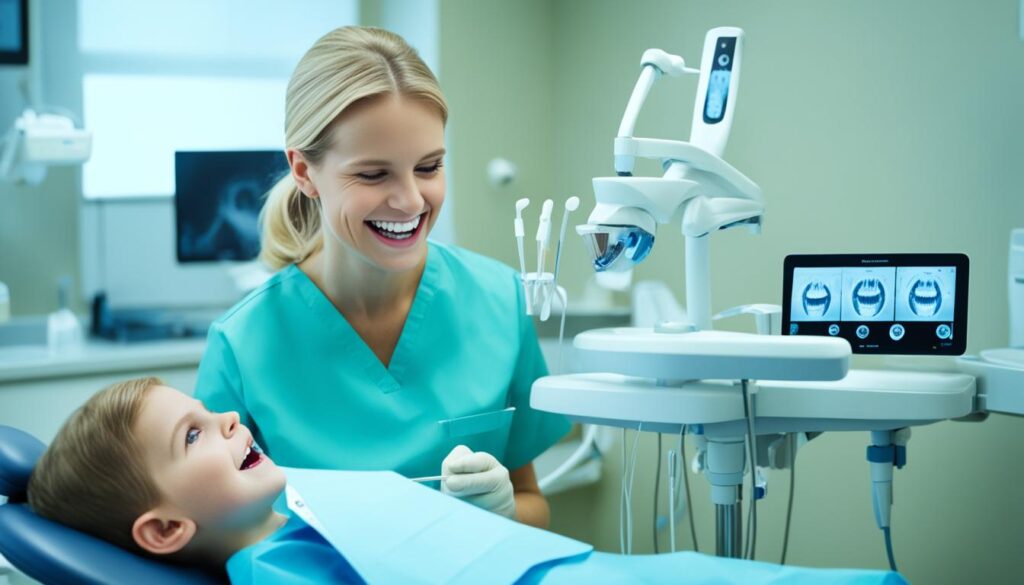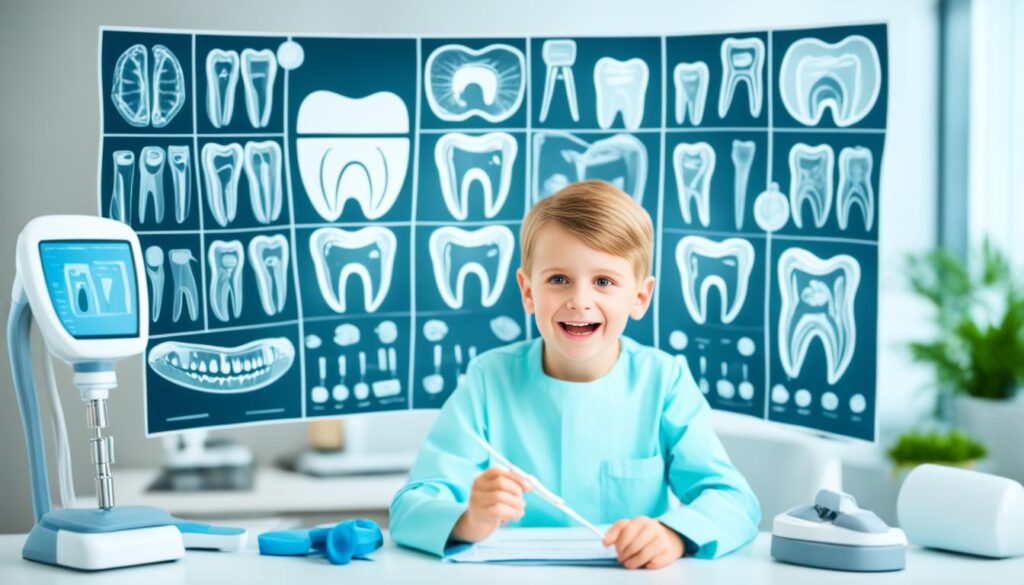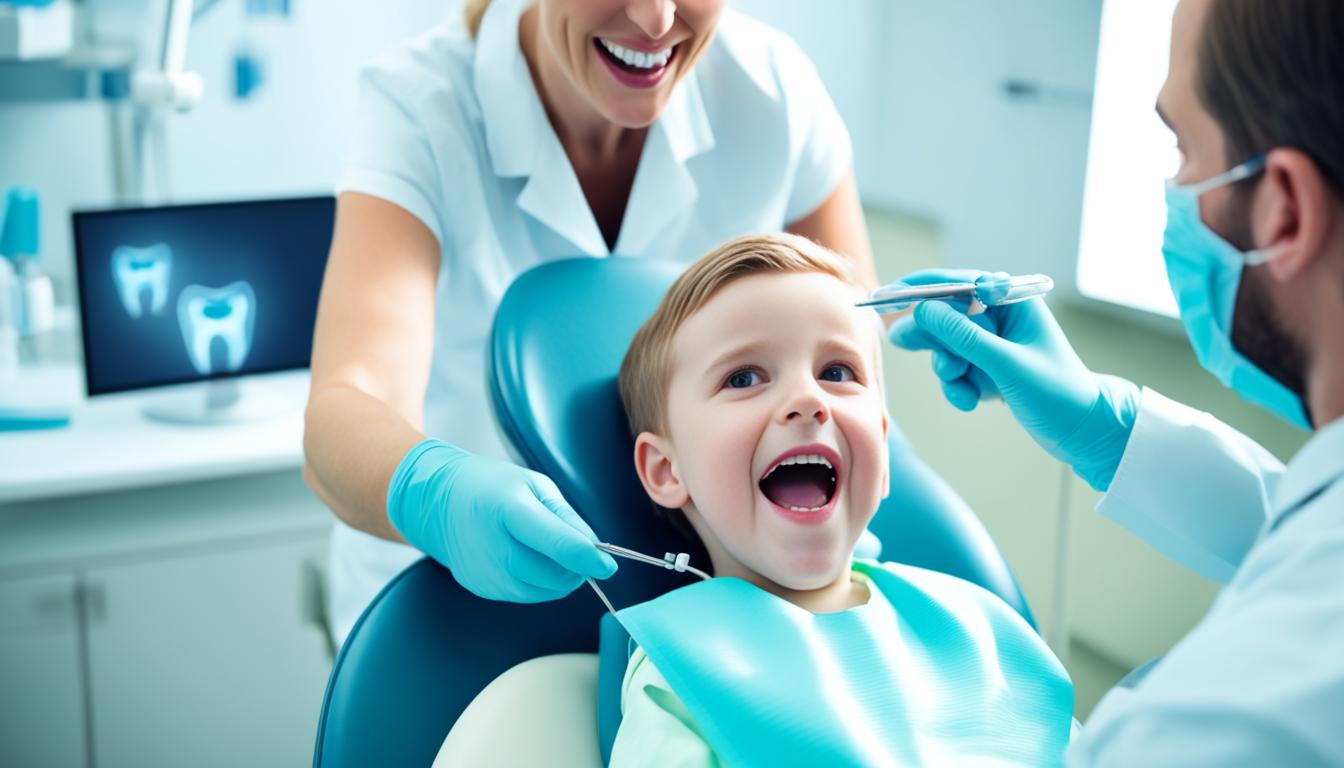As a parent, you may ask, “Can I Refuse Dental X-Rays for My Child?” This choice is not easy. It’s normal to worry about the risks, costs, and any pain from the X-rays. But, X-rays are key for your child’s dental health. This article will look at what you can do and what to think about. The goal is to make a choice that is best for your child.
Key Takeaways
- Dental X-rays are essential for early detection of oral health issues and evaluating root structure and bone density.
- Concerns about radiation exposure, cost, and discomfort during the procedure are valid and need to be addressed.
- Understanding the legal and ethical considerations, as well as ways to minimize radiation exposure, can help you make an informed decision.
- Discussing options with your child’s dentist and finding a compromise solution that meets your family’s needs is crucial.
- Evaluating your child’s risk factors and establishing trust with the dental team can aid in the decision-making process.
Understanding the Role of Dental X-Rays
Dental X-rays are key for finding and treating oral health problems. They let dentists see issues like cavities or gum disease that the eye can miss. These x-rays help check the roots and bone around teeth. Catching problems early helps keep treatment simple and not too costly, especially in kids’ dental care.
Why Dental X-Rays are Essential
Dental X-rays give dentists insights they can’t get from just looking. They spot issues like cavities or gum disease before they cause big problems. This means getting the right treatment early, which can save you from more serious and pricey fixes later on.
Identifying Oral Health Issues Early
Not all oral health issues are visible at first glance. X-rays can see cavities hiding and the start of gum disease. Finding these problems early means stopping them from getting worse. It’s about catching issues before they become major troubles.
Evaluating Root Structure and Bone Density
Revealing the root and bone health of teeth is another job of dental x-rays. This helps dentists know if teeth are strong and healthy. It guides them in choosing the best care and steps to keep your mouth in good shape.
Concerns About Dental X-Rays for Children
Parents worry about dental X-rays for their kids, and I get it. They’re important for finding issues, but radiation exposure risks for children are real. Even at low levels, this worries parents. The cost of dental x-rays can be high, and families on a budget might find it tough. Discomfort or anxiety during x-rays is another issue for kids. It makes the whole process not so fun. Talking about these concerns with your child’s dentist is key.
Radiation Exposure Risks
Parents often fear the radiation in dental X-rays. Yet, did you know the amount from a full set is like using TVs and phones? Dental X-rays pose a minimal risk, especially with the small doses they use. Still, more radiation can up cancer danger.
Cost Considerations
X-ray prices can stress some families. But early check-ups save money later. Spotting issues soon means less need for big treatments. Many dental offices let you pay over time, easing the money worry.
Discomfort or Anxiety During Procedures
For some kids, dental X-rays cause stress. But dentists try to make it better. They use friendly tools and create a welcoming space. Making the child comfortable can turn the X-ray visit into a positive one.
can i refuse dental x rays for my child
You can say no to dental X-rays for your child. If you worry about the risks or don’t see the benefits, it’s fine to refuse. Talk with your child’s dentist first. Consider your child’s oral health needs and risks.
Many parents choose not to have their children get dental X-rays. They worry about the radiation and the cost. But, skipping X-rays could mean missing early signs of dental problems.
X-ray refusal rates might be higher among parents of younger kids. Yet, X-rays are key for spotting issues early, checking bone strength, and keeping the mouth healthy in the growing years.
Sometimes, parents pick other ways to check on their child’s teeth, like just looking or using digital images. These are okay choices too. But, make sure to talk over what’s best with your dentist. This way, your child gets the right and best care.
Deciding on dental X-rays for your child is up to you. Think about the risks and gains carefully. By knowing your options and talking to your dentist, you can choose what’s healthiest for your child.
Legal and Ethical Considerations
Refusing dental X-rays for your child has both legal and ethical aspects worth noting. Dentists need your informed consent for these procedures, including X-rays. If you say no to X-rays, you may need to sign a form showing you understand the risks.
Informed Consent and Refusal Policies
It’s important for dentists to offer a high standard of care. Not getting X-rays might up the risk of being sued. While parents or guardians can say no, dentists need all the data for effective care to avoid lawsuits.
Discussing concerns about X-rays can help. Dentists might warn that not getting them could cause permanent dental damage. This emphasizes why proper diagnosis is key to good care.
Standard of Care and Liability Risks
Doctors should talk to their patients about why X-rays are needed. They must get permission for X-rays from every patient’s guardian. The rules for this depend on the state.
Getting permission is more than a formality. It’s crucial to record any refusals and why they happened. This record can help prevent legal issues later.
Deciding to keep treating a patient who won’t follow advice is another important choice. It speaks to the dentist and patient having different views or expectations. So, the decision may reflect these differences.

Minimizing Radiation Exposure
As a parent, I get why you might worry about radiation from dental X-rays for your kids. Luckily, we can lower this risk to keep our children’s teeth healthy and safe. Thanks to new digital X-ray machines, we need much less radiation to get clear pictures. Digital X-rays use up to 90% less radiation than the old film ones.
Dr. Bright and his team are ahead of the game in keeping radiation low for kids. They stick to the ALARA rule, meaning they use the smallest radiation amount needed for the job. They also put lead aprons and thyroid collars on kids to block any extra radiation they don’t need.
Comparing Radiation Levels
All dental X-rays give off a tiny amount of radiation, even the old-fashioned kind. But with digital technology, we’ve cut this down by 80 to 90%. This reduction is key because we all want our children to stay healthy while getting the help they need.
| X-Ray Type | Radiation Exposure |
|---|---|
| Traditional Film X-rays | Higher radiation levels |
| Digital X-rays | Up to 90% less radiation |
By knowing about digital X-rays and how dentists keep radiation low, I feel better about my choices for my child’s teeth. This knowledge lets me balance the good and the not-so-good of X-rays. And it helps me and Dr. Bright’s team work together for my child’s health and happiness.
Addressing Cost Concerns
The cost of dental x-rays worries many families. Yet, thinking long term shows the real value. Early detection and treatment cut down costs later. This means fewer major procedures and bills. Many dentists also provide payment plans, helping families afford x-rays and other services.
Long-Term Cost Savings
At first, paying for dental x-rays might seem like a lot. But the benefits over time are huge. Spotting dental problems early means easier and cheaper treatments. This saves a lot of money in the future. Acting early can keep you from needing costly procedures later on.
Payment Plan Options
Dentists know medical costs can be hard on families. That’s why many offer payment plans for dental care, including x-rays. These plans let you pay over time or in parts, making it easier to manage expenses. Make sure to talk to your child’s dentist about payment options. They can help you pick the best plan for your family’s budget.
Preparing Children for X-Rays
Are you worried about getting your child ready for dental X-rays? Don’t be. By preparing well and choosing the right words, both you and your child will feel less stressed. The main tip is to talk to them in a way that fits their age and keep the mood positive. This helps lower any fears or worries they might have.
Age-Appropriate Explanations
Talking to your child about dental X-rays should be simple and clear. Use words they understand. Tell them X-rays are like tooth pictures to help keep their mouth healthy. Stay away from big words or complicated talks. These can make kids confused or scared.
Creating a Positive Experience
The dentist and their team have a big part to play in making X-rays easy. They might use special X-ray tools that are smaller and less scary. Plus, they work hard to make the dentist’s office a fun place. It’s full of bright colors, toys, and things to do. This all helps your child feel better and not so worried.
Getting your child to help and feel comfortable is key. With your help, the dentist, and your child all working together, it can turn into a good experience. Not scary, but smooth and stress-free.
Alternative Diagnostic Methods
Dental X-rays are seen as standard, but there’s more. Alternatives like visual examinations, manual probing, and non-radiographic diagnostic tools, such as digital imaging, exist. They do not use radiation. Talking to your child’s dentist about these alternatives to dental x-rays for children can find a safer way to get needed info.
Visual exams let dentists look for decay or issues. Manual probing checks teeth without X-rays. Tools like digital imaging techniques, with cameras, can show detailed tooth and mouth images, all without radiation.
Using non-radiographic diagnostic tools, a plan can be made that’s safe for your child’s health. It keeps monitoring their oral health without adding radiation risks.

Discussing Options with Your Dentist
Discussing your child’s dental care and X-ray usage with their dentist is vital. It’s all about shared decision-making. This means you and the dentist talk openly, share worries, and find a compromise solution. You’ll look for what’s best for your child and what respects your thoughts.
Open Communication and Shared Decision-Making
Talking and working with the dental team helps. You can find ways to minimize the number of X-rays needed. This makes sure your worries about discussing dental x-ray options with your child’s dentist are listened to.
Finding a Compromise Solution
Working together, you and the dental team can reach a compromise solution. This means finding a balance. You’ll think of ways to use fewer X-rays but still look after your child’s mouth. This might mean using different tests, fewer X-rays, or other helpful steps.
Evaluating Your Child’s Risk Factors
Refusing dental X-rays for your child should be a careful decision. Look at their dental past, how well they take care of their teeth now, and their age. Things like past dental problems, having cavities filled, or new teething can mean they need X-rays more often. Knowing this can guide you to a smart choice with your child’s dentist about evaluating child’s dental x-ray risk factors.
Dental History and Oral Hygiene
Your child’s teeth and how they care for them are key in this decision. If they’ve had cavities before, X-rays might be necessary to stay ahead of any new issues. The way they brush and floss also tells a lot. It can let you know if they’re at risk for more dental problems.
Age and Developmental Stage
How old your child is and their stage of growing up matters too. As their teeth grow and change, new teeth can mean new X-rays are needed. Talking with your child’s dentist will help set the right schedule. This is based on what your child needs and how they’re growing.
Establishing Trust with Your Dental Team
It’s very important to trust your child’s dental team when dealing with X-rays. Making a good connection with the dentist and their team is key. You’ll feel more at ease sharing your worries and finding the right choice for your kid’s teeth. They should be open, clear, and ask for your input when deciding things.
Building a Positive Relationship
Create a strong bond with your dentist and their crew. Spend time chatting with them and voicing your concerns. This type of talking can build trust with your child’s dental team. It makes you feel understood and respected.
Addressing Concerns and Fears
Many parents worry about their kids getting X-rays. And that’s normal. But your dental team should be there to listen and explain everything. They will make sure you’re well-informed and comfortable with the choices made for your child.
Balancing Risks and Benefits
Deciding on dental X-rays for your child means thinking about risks and benefits. The key is understanding the actual risk from the radiation. This helps compare it to other sources of radiation in daily life.
Understanding Radiation Exposure Levels
Compared to older film X-rays, children get 90% less radiation from a dental X-ray. Digital X-rays are both safer and quicker, with lower radiation use. The NCRP says half our radiation exposure comes from natural sources. The other half is from technology like X-rays and CT scans.
Considering Long-Term Oral Health
Looking at long-term oral health is important. X-rays help catch problems early, preventing more serious issues later. They reveal hidden cavities, show gum health, and track teeth and jaw development. Digital X-rays offer detailed, editable images, reducing radiation by about 80% compared to traditional X-rays.
Making an Informed Decision
The choice to skip dental X-rays for your child is up to you. It’s best made after knowing all sides. You need to learn what X-rays do, their risks, and how they can help. You have the right to pick, and your child’s dentist should help without pushing. Together, you can choose what’s best for your child’s health.
To choose wisely about X-rays, look at many things. Think about your child’s risks and what new x-ray tech offers. Also, consider the good and bad of getting X-rays. Your child’s dentist should talk openly with you. They should help you understand and answer questions too.
Respecting your choice is very important in your child’s health. Dentists must meet a good care level but also value your role as decision-maker. Teamwork with dental staff can lead to a decision that’s right for your child’s mouth and respects your views.

Conclusion
Deciding whether to have your child take dental X-rays is tough. It needs deep thought because X-rays play a key role in taking care of teeth. Yet, parents worry about their child facing radiation, the money it costs, and if it will make them upset.
It helps to learn how X-rays work and to know how to keep the risks low. With your dentist’s help, you can figure out what’s best for your child’s dental health and your peace of mind.
The American Dental Association (ADA) and the U.S. Food and Drug Administration (FDA) give guidance on when dental X-rays are right. But, some families choose not to get them because of worries about money, how they feel, and radiation. Digital X-ray use has cut down the radiation people face by a lot. A common set of four bitewing images only gives as little radiation as what we get from nature in a day.
Making the right choice about dental X-rays should be a team effort with your child’s dentist. It’s about talking over your worries and what your child needs. This way, you can choose what’s best for your child’s oral health in a way that feels right for you.
FAQ
Can I refuse dental X-rays for my child?
Yes, you can say no to dental X-rays for your child. You might worry about risks or not see enough benefit. Talk with your child’s dentist first. Consider your child’s oral health and risks.
What are the legal and ethical considerations for refusing dental X-rays?
Dentists must get your okay before doing X-rays, as part of informed consent. If you don’t want them, you may need to sign a form about the risks. Remember, dentists must provide good care. Not doing necessary X-rays could be seen as a risk for them.
How can I minimize radiation exposure during dental X-rays?
Today’s digital X-rays need a lot less radiation. Dentists can also use techniques to lower the dose. They choose the best X-ray type to see what they need without over-exposing.
What are the cost considerations for dental X-rays?
Dental X-ray costs might worry you. Yet, finding problems early can save money in the long run. Many dentists offer ways to pay over time, making it easier for families.
How can I prepare my child for the dental X-ray procedure?
It’s key to calm your child before X-rays. Explain it in an easy way for their age. Dentists can also use things like special gear and a friendly setting to help.
Are there any alternatives to dental X-rays for my child?
Yes, in some cases, other tools like visual checks or digital images that don’t use radiation can be fine. Talk with the dentist to pick what’s best and safest for your child.
How can I establish a trusting relationship with my child’s dental team?
Trust is vital in dealing with dental X-ray choices. A good dentist and team will listen, provide clear details, and work with you on these decisions.
How do I evaluate my child’s risk factors for needing dental X-rays?
Your child’s dental record, how well they care for their teeth now, and their age are key factors. Knowing these helps in deciding if and how often they need X-rays.
How do I balance the risks and benefits of dental X-rays for my child?
Think about the risks of X-rays and their benefits for your child’s health. Knowing the actual radiation levels and comparing them to daily risks can guide your choice.








